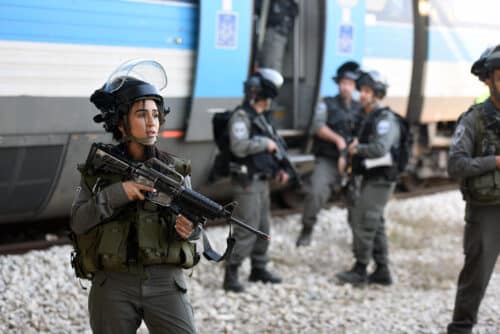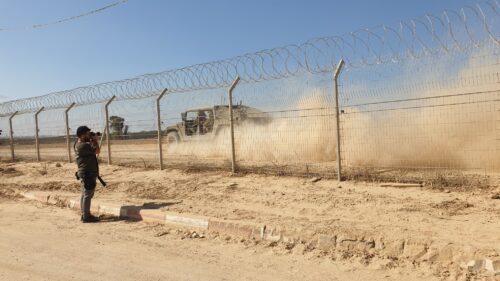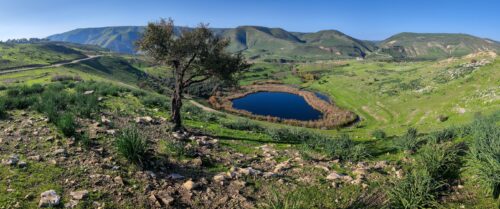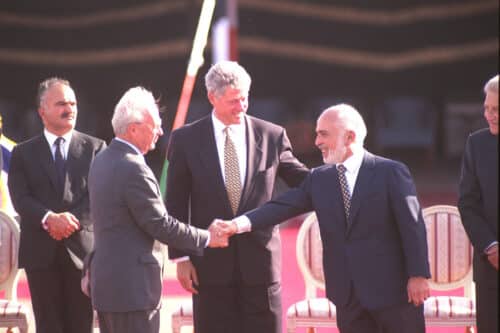Amjad and Hakeem Awad are millionaires. Each of them is expected to receive about NIS 7 million from the Palestinian Authority. What did they do to receive such enormous sums? Murder Jews. Amjad and Hakeem are those who murdered in cold blood five members of the Fogel family From Itamar, including a 3-month-old baby, and therefore receive payment from the Palestinian Authority for each year in prison they serve. If Amjad and Hakeem are released as part of some prisoner exchange, they could work for the Palestinian Authority, which is required by law to employ released terrorists in its ranks in order to provide them with economic and job security.
This incentives mechanism is not concealed, swept under the rug or whispered in backrooms. This is the avowed and clear policy of the Palestinian Authority, which leave a trail of Jewish blood behind it. In order to assess the scope of this phenomenon, we decided to research and construct, for the first time, the full picture of the Palestinian terror financing mechanism. We did this by reviewing the Palestinian law, analyzing the economic conditions in the Palestinian Authority and translating the declarations and speeches of senior Palestinian officials.
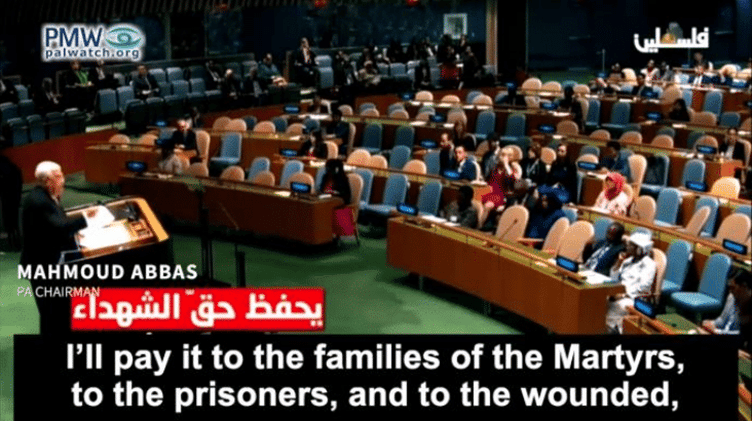
A Billion Shekels Per Year: This Is What an Official Policy for Murdering Jews Looks Like
Under Palestinian law, imprisoned terrorists receive remunerations in accordance with the number of years they serve in prison, with salaries reaching NIS 12,000 per month from the 30th year and onward. This is a level of wages that is equivalent to that of the President of the Palestinian Supreme Court, eight times higher than the average minimum wages in Judea, Samaria and Gaza, and four times higher than the monthly income per capita for an average Palestinian.
Additional payments are added to the salaries paid to terrorists while serving their sentences. For instance, imprisoned terrorists who have been released after serving over five years of actual prison time continue to receive wages even after their release, this in addition to a one-time release grant between $5,000 and $25,000. As stated, the Authority is also required by law to employ released terrorists in its ranks in order to grant them economic and job security for the rest of their lives, including fully subsidized health insurance and education, as well as prioritizing them in the annual assignments for positions in all government institutions.
In practice, the Authority expends on average over NIS 1 billion per year as payment to terrorists and their families, an amount that is equivalent in most of the years surveyed in the study to about 7% of its budget, and almost half of all the foreign aid that it receives from other countries and donors.
Thus, for instance, in 2018 the total budget for payments to imprisoned terrorists, released terrorists and the families of the “Shahids” and injured stood at NIS 1.237 billion, which was about 7.4% of the Authority’s budget, or about 44% of the total foreign aid budget it was supposed to receive from other contributing countries and entities.
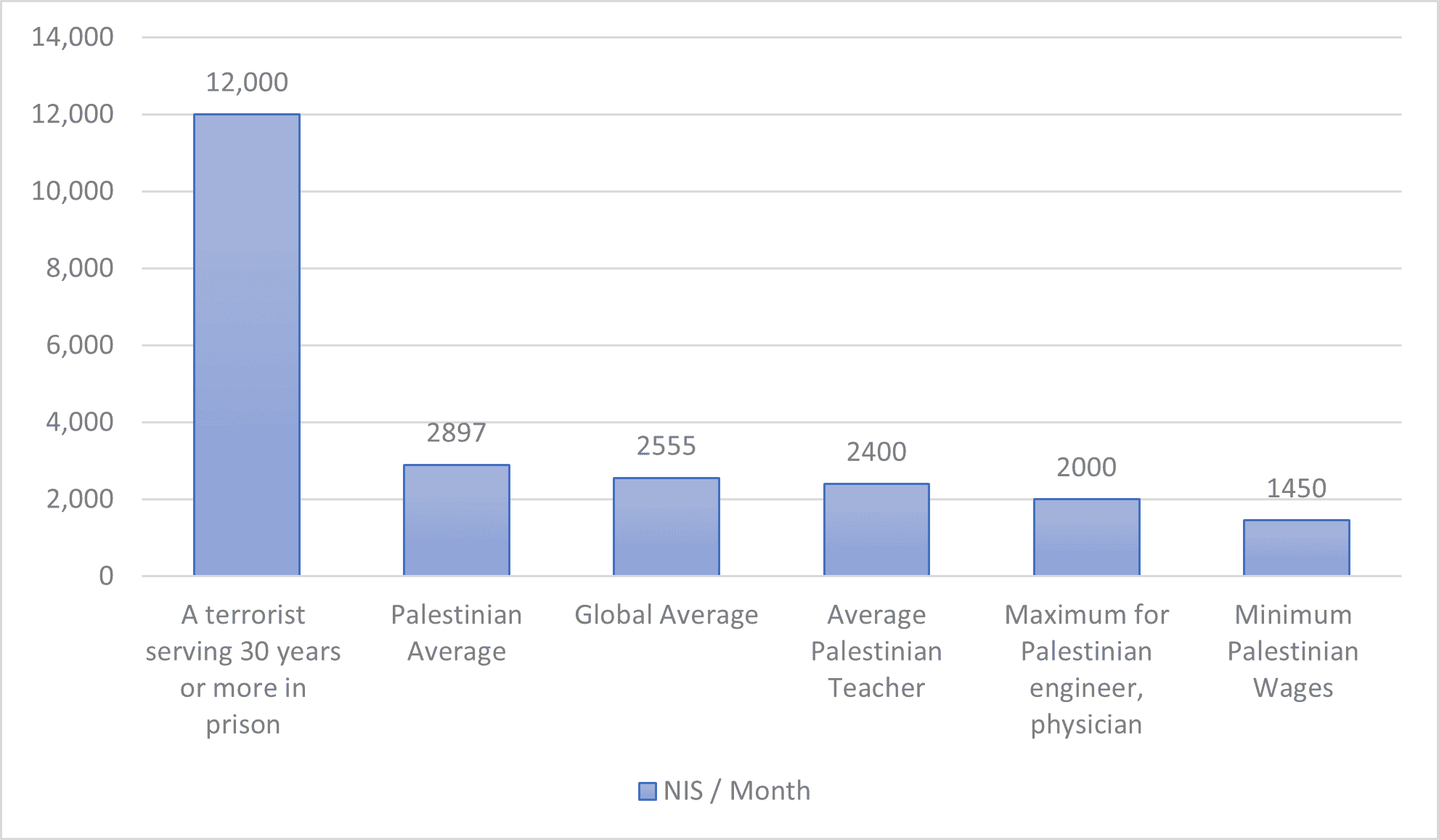
Source for global average wages: The International Labor Organization (ILO)
The numbers leave no room for doubt: this is an official and widely extensive mechanism of terrorism, which constitutes an important and central pillar of the Palestinian Authority’s general activities. This mechanism of bloodshed creates a reality in which it is worthwhile for the Palestinian citizen to choose terrorism as a route for action that not only wins him honor and appreciation, but also rewards him generously – much more than the average Palestinian citizen. Not only does this constitute an incentive for murder (since the money is promised in advance) and a gross violation of the Oslo Accords, but it is also a systemic standardization of the Palestinian armed conflict. Unfortunately, this mechanism is also showing results in the field: at present, 5,000 prisoners and 7,200 released prisoners are enjoying these payments, in addition to the 37,500 families of the “Shahids” and the injured.
Murder as a Preferred Profession: The Shahids are at the Top of the Palestinian List of Priorities
The Palestinian Authority enjoys the image of a civil, moderate and pragmatic Palestinian government, especially when compared to the competing Palestinian organization Hamas. But the numbers tell a different story, one where the Palestinian Authority takes an active and deliberate part in the armed struggle against Israel in many ways, including by way of operating a well-oiled and heavily budgeted mechanism intended to incentivize popular organized terrorism against innocent Israelis. This mechanism can be called Pay for Slay – payment for the killing of Jews or, put another way: murder as a preferred profession.
It is important to remember that terrorism is considered a central and legitimate tool in the realization of the PLO’s and the Palestinian Authority’s ultimate goal: The establishment of a Palestinian state with the destruction of the State of Israel. Within this framework, the salaries and employment mechanism is viewed by the Authority as an important strategic pillar in preserving terrorist operations and transforming the Palestinian armed struggle into an institutionalized policy.
This mechanism may not be prominently visible to the outside observer, but if one listens to the Authority’s senior officials, they learn that this is an avowed and clear policy spoken loudly and clearly, and published in the media and on openly available sources.
Thus, for instance, Mahmoud Abbas, President of the Palestinian Authority, who had called the “Shahids” the “Stars in the sky of the Palestinian people struggle” who are at “the top of the Palestinian list of priorities”, emphasized repeatedly, including from the podium of the UN, that “even if we only had one cent in our hands, we would pay it to the families of the Shahids and the prisoners.”
By engaging in this activity, the Palestinian Authority meets the Israeli and global definition of a “terrorist organization”: not only does it incentivize terrorism and finances terrorism through prisoners, released prisoners and the families of the “Shahids” and the injured, but it also employs many of them as public servants – including, absurdly enough, in the ranks of its own security forces who are supposed to be fighting terrorism.
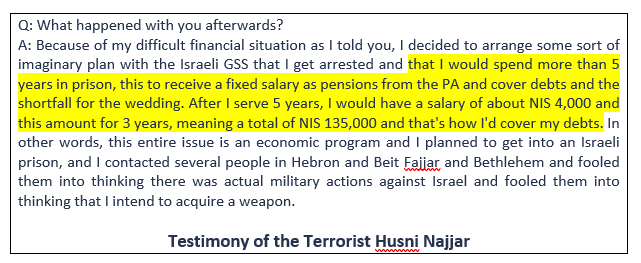
How do Israel and the world respond?
Israel, as well as the United States, have passed laws against this phenomenon. In Israel, a law was passed to freeze funds that the Palestinian Authority transfers to terrorists out of the taxes that are collected for it by Israel, while in the United States the law prohibits the transfer of certain economic aid to the Authority as long as this policy persists.
But in the greater scheme of things, the international community for the most part, has responded to this phenomenon with language that is weak and accepting of the Palestinian Authority’s victimhood narrative, even though the Authority’s policy completely contradicts the global struggle against terrorism. Transferring the funds of the contributing countries to the terrorists also contradicts the laws of the contributing countries themselves, as well as international conventions pertaining to terrorist financing. Indirectly, this aid money constitutes a significant injection of oxygen into the Authority’s terrorist mechanism against innocent Israelis under the cover of humanitarian aid.
The Goal: Knesset Members, Diplomats and the American Congress
The study was accompanied by Brigadier General (res.) Yossi Kuperwasser, the former Head of the Research Division in IDF Intelligence Corp. and Colonel (res.) Maurice Hirsch, the former IDF Chief Prosecutor in Judea and Samaria. “The research we conducted assembles, for the first time, the full picture of the Palestinian terrorist financing mechanism”, says Or Yissachar, Head of the Research Department of the IDSF and the person who prepared this report. “The data clearly shows the Palestinian Authority’s commitment to the armed campaign against the State of Israel.”
So, what can be done? A lot. First, on the economic level: we can define the Palestinian Authority as a terror financing entity, including the freezing of economic aid and cooperation on the part of the international community and shutting down its consulates. We can also enforce the Offset Law in Israel in order to force the Authority to choose between complete economic collapse and the salary mechanism for terrorists and their employment. On the political level, we must make it clear to the Authority that any progress towards a final political settlement is contingent upon the immediate and permanent termination of this policy on the part of the Authority. Finally, we must encourage a fact-based discussion that puts the true nature of the Authority as an organization that employs terrorism against Israelis on the center stage, irrespective of the political position regarding negotiations with it or with any other Palestinian entity.
The key points of the research have been formulated into an official position paper of the IDSF and have enjoyed broad media attention. The position paper was even submitted to all members of the Knesset, as well as to foreign diplomats in Israel.
“We continue to act”, Or Yissachar clarifies. “We continue to follow the report’s impact among the decision makers and continue to distribute it among American Congressmen.”
To download the full position paper
https://idsf.org.il/en/position-papers/terrorists-in-the-civil-service/


